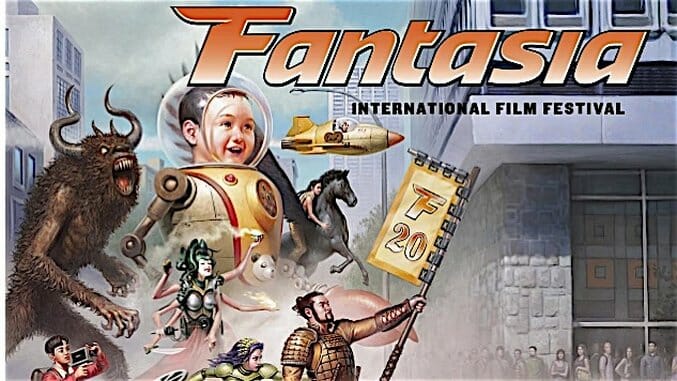Genre Gets Its Due at the Fantasia International Film Festival

As the lights fade and the audience settles in for the film, it starts. First from one voice to the left. Then way in the back. Meow! Mew? The literal cat calls (with the occasional smartass dog bark or sheep’s baa) scatter around the Concordia University halls for the few dark moments between the house lights fading and the film commencing. These cat mews are nothing new to the audience, as they stretch far back into Fantasia International Film Festival’s history. (Their origin is debated, but the most commonly accepted origin story is that the mewing started after one screening of a Simon’s Cat short film.) Do not let the momentary rambunctiousness fool you into thinking that the participatory audience is going to be rowdy and interrupt the screening. After the film begins, you will be in the company of diehard genre film fans who will keep perfectly and politely silent for the rest of the film. That is, unless the villain gets decapitated in a particularly violent manner. Justice deserves applause.
The Fantasia International Film Festival celebrated its 20th installation this year, and it had plenty to celebrate. It is easily one of the world’s leading genre film festivals. Spanning a full three weeks in two constantly screening theaters on the Concordia University campus, Fantasia is more of a marathon than a sprint. Local Montrealers pace themselves and take in what screenings they can without losing their day jobs, and film industry professionals fly in from around the world for as much of the fest as their schedule allows. Unlike some of shorter four-to-ten day film festivals, there is an understanding that most people will come for a small sliver of Fantasia’s programming, forever fueling their FOMO (Fear Of Missing Out). Choosing the right week or two to attend the fest is a difficult task as there is no such thing as a “wrong” week of Fantasia. Every day brings world premieres, impressive film guests, and satisfied audiences. This year early attendees were treated to two genre godfathers: Takaski Miike and Guillermo del Toro.
Miike was on hand to accept his Lifetime Achievement Award from the festival. Wearing sunglasses, red metallic sneakers, and accompanied by his multilingual interpreter, the cinematic legend humbly enjoyed soaking in the appreciative applause of his fans. With a career spanning over 100 films, Miike was quick to credit Fantasia with being his first introduction to the West. Over the festival’s 20 iterations, approximately 30 Miike films have screened, including two this year alone. Miike is best known to horror fans for creating the slow-burning Audition and highly tense Ichi the Killer, but Miike’s two screenings at this year’s festival showed his other interests as a director.
Terraformars and As the Gods Will both are based on popular Japanese manga series. Each has a playful tone, and an alarmingly high body count, but that is where the film’s commonalities end. Terraformars is a science fiction-fueled battle where we are rooting for a team of human-insect hybrids to reclaim Mars from the humanoid cockroaches who have taken over the planet. It is essentially a mash-up of Starship Troopers, The Martian, and Power Rangers, and plays out like an interspecies land war. Not only do you learn a bit about entomology, but you also get to watch powerful creatures battle one another for Martian domination.
As The Gods Will has similarly preposterous circumstances, though far less exposition. In fact, most of the characters have no idea what is happening. What we do know is that the film opens with classmates being killed by a massive doll head that has been brought to life, sitting impatiently at the front of their classroom. This disembodied head is toying with them and their lives, but they soon figure out the rules of his deadly game. Violating the rules of the game (which is essentially red light/green light) results in the student’s head exploding, complete with a blood geyser. As soon as the rules of this game are mastered, and the game bested, the few survivors are whisked off to the next deadly challenge. Closely resembling the feel and pace of Sion Sono’s Tag, As The Gods Will showcases Miike’s ability to balance death with delight. Mourning and mischief are not mutually exclusive in Miike’s worlds.
In attendance to accept the Cheval Noir Award was Guillermo del Toro. The jolly Mexican director endeared the audience with a one-hour Q&A following the screening of the documentary Creature Designers: The Frankenstein Complexi. A fairly standard exploration of the history of special effects and creature creation, the film briefly highlights del Toro’s work in creature design as well as the now necessary marriage of digital and practical effects. Del Toro speaks with such conciseness and insight that it is as if his flowing thoughts are all specifically designed to be soundbites. He told the audience that he thinks of his films as if they were his children, and of being willing to die for his art. He speaks of his long-delayed At the Mountains of Madness as a miscarriage, with a deep sense of loss and pain. He also spoke of the importance of Fantasia and other genre film festivals, to bring together the monster kids of the world and inspire them.
-

-

-

-

-

-

-

-

-

-

-

-

-

-

-

-

-

-

-

-

-

-

-

-

-

-

-

-

-

-

-

-

-

-

-

-

-

-

-

-








































